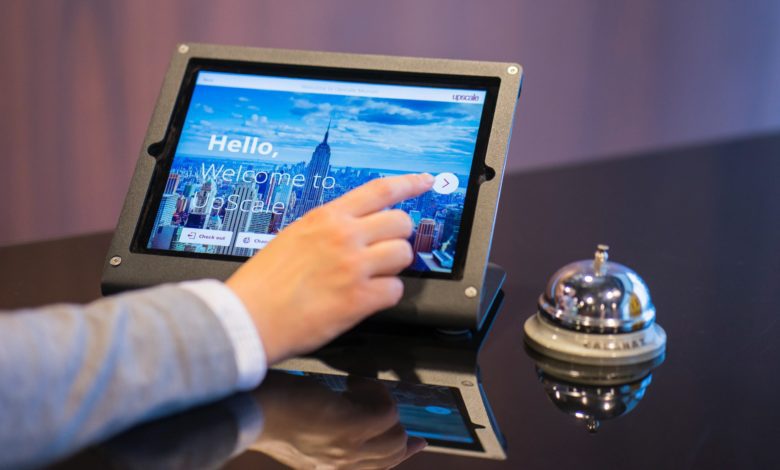Top tech trends for the hotel industry today

While some 43% of hospitality venues believe they already have all the software solutions they need, 37% of venue operators may not have what they require and 20% are aware they don’t have the systems they need, according to the latest ResDiary Beyond the Booking hospitality report.
Meanwhile, 30% of respondents thought of themselves as early adopters of technology. However, 57% reported preferring to bide their time to allow others to test the new technology emerging within the industry. In addition, almost two-thirds of venues said their reliance on technology will increase in the next 12 months.
In the spirit of choosing the right functions for your hotel, here are the top technology trends to watch in 2024:
Predictive ordering
Predictive ordering is not new for hospitality, having been identified as one of the top restaurant trends for 2019, but it is starting to be considered by hoteliers. Operators such as Wetherspoons have implemented predictive ordering in their apps to help prevent over-ordering, reduce the time spent making orders, and track demand spikes caused by special occasions. According to Horizon Hospitality, restaurants that have already adopted predictive ordering reported an increase in profitability and a reduction in stress.
Using artificial intelligence, predictive ordering forecasts customer orders, based on their patterns of use and previous orders. While it can help businesses reduce food waste and boost profitability, this function can also aid in delivering better customer experience; it ensures that necessary supplies are always on hand.
Automated waste management
Hoteliers have become more mindful of their environmental footprint in recent years, having adopted paperless technology; saved energy by installing motion sensing lighting in areas like corridors and bathrooms; and eliminated waste altogether by turning to refillable shower amenities instead of disposable miniatures.
That said, food waste still makes up over 50% of waste in the hospitality industry. Each day, businesses in the hospitality industry discard tons of edible food. Not only is this a loss to the company in terms of money wasted on supplies, but it’s also a social and environmental issue. To address the problem of food waste, many businesses are turning to automated waste management strategies.
These technologies encompass a range of solutions, such as the Internet of Things (IoT), advanced analytics, artificial intelligence, robotics and chemical recycling, to name a few. These functions aim to make businesses more environmentally friendly by revealing buying and usage patterns to business owners. This approach can contribute to long-term change.
Voice search and voice control
Voice search and voice control are picking up pace among those in the tourism industry, as it also improves guest experiences and streamlines operations – particularly when it comes to foreign guests, seeing as voice assistants are also multilingual. This allows hotels to customise responses to guests who are not acquainted with the local dialect.
This technology also allows guests to manage their travel plans, request services and get information through the use of their voice. It can even answer frequently asked questions about your venue, and in doing so, free up your concierge’s time to greet new guests. According to ResDiary’s recent hospitality report, staff requirements were the driving force for 33% of hotels adopting new tech.
Contactless payments
Contactless payments offer several advantages for hotels, resorts, restaurants, bars and cafes, which is why this has been among the main technology trends in the hospitality industry. Aside from speeding up payments and improving customer satisfaction, contactless tech is also easily compatible with loyalty programs.
Mobile contactless payments are possible even if customers do not have their wallets or their credit card has been misplaced. Additionally, with Covid still in the minds of some hotel guests and other hospitality customers, contactless payments can also offer an excellent way to reduce human-to-human contact.
Robots in hotels and restaurants
The hospitality industry is getting to grips with the rise of robotics and the use of robots to carry out tasks that were traditionally performed by humans. For instance, robots can occupy a concierge role within hotels, welcoming guests and providing them with important customer information. Similarly, some hotels have started using robots for cleaning, such as vacuum cleaning floors and even germ-killing.
Chatbots
Hotels and restaurants will often attract queries from people in different time zones, so having staff available is difficult. A good chatbot will answer the most common questions without requiring human involvement. In more advanced cases, the chatbot can obtain information from the customer and then pass the query on to a human staff member at the earliest opportunity while providing them access to what the customer has said.
Using ChatGPT
ChatGPT is powering some of the most important technology trends in the hospitality industry today. It can be used to power chatbots that deliver 24/7 customer support, answering questions and resolving issues with no waiting. It can also help analyse consumer data to help create personalised experiences. ChatGPT can automate a range of functions and services, streamlining operations for hotels, restaurants, entertainment venues, and other businesses.
Mobile check-in
Mobile check-in is another important area to consider in the hotel industry, because it can help to improve the customer experience at the point of their initial arrival. This is especially beneficial because first impressions can greatly affect how customers ultimately feel about their visit or stay.
Crucially, mobile check-ins swerve the need for face-to-face customer interactions, meaning customers can potentially have greater flexibility regarding when they check-in. This ties in with wider contactless technology trends within the hospitality industry.
Wi-Fi 6
Wi-Fi 6 is the next generation of Wi-Fi technology and is more than 30% faster while also boasting significantly improved throughput. Such improvements to Wi-Fi technology are especially important in an age where businesses are using a greater number of smart or IoT devices while customers are also increasingly connecting phones, laptops, tablets, and other devices to Wi-Fi. Faster and more reliable Wi-Fi can help hospitality companies to stand out from rivals.









